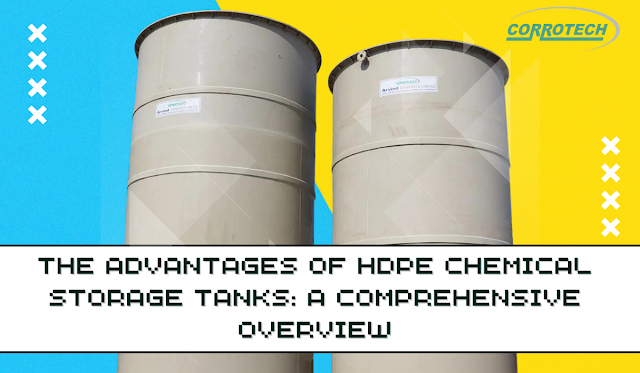The Advantages of HDPE Chemical Storage Tanks: A Comprehensive Overview
Chemical storage is a critical aspect of various industries,
ranging from manufacturing to healthcare. Ensuring the safety and integrity of
stored chemicals is paramount to prevent accidents, environmental hazards, and
financial losses. In recent years, High-Density Polyethylene (HDPE) chemical
storage tanks have emerged as a popular choice due to their numerous advantages
over traditional alternatives. This article delves into the benefits,
applications, case studies, challenges, and future prospects of HDPE chemical
storage tanks.
Advantages of HDPE Chemical Storage Tanks
HDPE Chemical Storage Tanks offer several advantages that
make them preferable over other materials like steel or fiberglass. Firstly,
HDPE is highly resistant to corrosion, chemicals, and rust, making it ideal for
storing a wide range of hazardous substances. Its lightweight design simplifies
the transportation, installation, and maintenance process in comparison to
bulkier options. Additionally, HDPE tanks are durable and have a longer
lifespan, reducing the need for frequent replacements and associated costs.
Moreover, HDPE is a recyclable material, aligning with sustainability goals and
reducing environmental impact.
Applications of HDPE Chemical Storage Tanks
The versatility and reliability of HDPE chemical storage
tanks make them suitable for various industries and applications. In the
agricultural sector, HDPE tanks are used for storing fertilizers, pesticides,
and other agrochemicals. In the manufacturing industry, they serve as primary
containers for storing acids, alkalis, solvents, and other chemicals used in
production processes. Municipalities utilize HDPE tanks for water treatment,
wastewater management, and storage of chemicals used in municipal services.
Furthermore, HDPE tanks find applications in the pharmaceutical, food
processing, mining, and automotive industries, among others.
Case Studies and Examples
Numerous case studies highlight the effectiveness of HDPE
chemical storage tanks in diverse industrial settings. For instance, a
pharmaceutical company successfully replaced its steel storage tanks with HDPE
tanks to store various chemicals used in drug manufacturing. This switch not
only enhanced chemical compatibility but also reduced maintenance costs and
downtime due to corrosion-related issues. Similarly, a municipal water
treatment plant upgraded its storage infrastructure by implementing HDPE tanks,
resulting in improved efficiency, reliability, and safety of chemical handling
processes.
Challenges and Considerations
While HDPE chemical storage tanks offer significant
advantages, certain challenges and considerations must be addressed to ensure
optimal performance and safety. One challenge is compatibility testing to
ascertain the suitability of HDPE for specific chemicals, as certain substances
may degrade or react with the material over time. Proper installation,
including adequate support and anchoring, is crucial to prevent structural
failures, especially in areas prone to seismic activity or extreme weather
conditions. Furthermore, regular inspection, maintenance, and adherence to
industry standards and regulations are essential to mitigate risks and ensure
compliance.
Future Prospects and Innovations
The future of HDPE chemical storage tanks looks promising,
with ongoing research and innovations aimed at enhancing performance,
durability, and sustainability. Advances in material science may lead to the
development of even more chemically resistant HDPE formulations, expanding the
range of applications and compatibility with a broader spectrum of chemicals.
Furthermore, innovations in tank design, such as improved structural
reinforcement and integrated monitoring systems, can enhance safety and
reliability while reducing environmental impact.
Conclusion
HDPE chemical storage tanks represent a significant
advancement in industrial storage solutions, offering a host of advantages over
traditional materials. Their corrosion resistance, durability, lightweight
nature, and recyclability make them an ideal choice for storing a wide range of
chemicals across various industries. Despite certain challenges, proper
consideration of factors such as compatibility, installation, maintenance, and
regulatory compliance can ensure the safe and efficient utilization of HDPE tanks.
Looking ahead, continued innovation and research hold the promise of further
improving the performance and sustainability of HDPE chemical storage
solutions, contributing

.webp)
.png)
.webp)
Comments